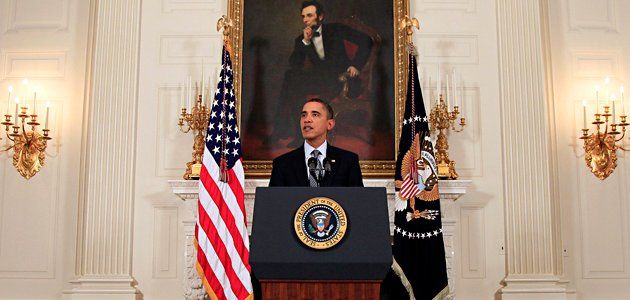
To the extent that the Obama administration has a strategy on the turmoil in Egypt, it seems, for now, to want to remain as neutral as possible.
In the wake of escalating confrontations between protesters and riot police across most of Egypt, the White House announced Friday it was monitoring the situation closely and for most of the day refrained from making any statements that could potentially exacerbate the uproar.
Egypt's rioters, angered over limited political freedom and a stagnant economy, took to the streets beginning on Wednesday calling for the immediate resignation of longtime president Hosni Mubarak. Photos and news reports have shown repeated clashes with police and members of the Egyptian Army, which Mubarak called in on Friday to quell the violence.
In a long-awaited statement from Mubarak, the president said after 12:30 a.m. local time that he understood frustrations in the country, but that violence among citizens was neither an appropriate nor acceptable form of expression. In response to calls for his resignation, he said instead that he had asked the entire government to step down, and would appoint a new government over the weekend that would have "clear and definite" duties. He added that he is "on the side of the people" and vowed to take steps to guarantee the freedom of Egyptians, develop job opportunities and to "stand by the poor." His vow did not appease protesters, who erupted in the streets immediately after the statement. The protestors—some of whom have torn down or defaced portraits of Mubarak around the country—have largely blamed the president for the country's ills.
Shortly after the statement, Obama delivered brief remarks in the State Dining Room of the White House. He said he had spoken to Mubarak immediately after Mubarak's statement in Cairo (the call lasted 30 minutes) and urged him to end the military's violence against protesters. But he stopped short of offering support for either side. "Ultimately the future of Egypt will be determined by the Egyptian people," Obama said. "We've also been clear that there must be reform: political, social, and economic reforms that meet the aspirations of the Egyptian people."
On Friday morning in Washington, Secretary of State Hillary Clinton had made similar calls for the government to immediately engage with its people and expressed concern about the military's and police force's use of violence against protestors. Clinton also urged protestors to express themselves peacefully and avoid rioting, which had broken out in several Egyptian cities. According to reports, more than 100 people have so far been killed in the clashes. Famed Nobel laureate Mohamed ElBaradei was also put under house arrest.
The administration's most definitive statement on the situation in Egypt came from Vice President Joe Biden on Thursday, who offered clear support for Mubarak and his government. He called Mubarak "a close U.S. ally" and praised him for being "very responsible" for helping to stabilize the region, but urged him to address his people's "legitimate concerns."
The complexities in the region, however, seem to complicate just how deeply the full U.S. government is willing to become involved. One of few U.S. allies in the Middle East part of the world, Egypt has traditionally been a source of stability in an otherwise volatile region. Since taking office Obama has publicly supported Mubarak but privately urged him to address the concerns of his people. While some protestors have sought intervention from the U.S. to help bring down Mubarak, it's not clear who or what type of government would replace him.
Also at stake could be the $1.5 billion in foreign aid the U.S. transfers to Egypt each year. At a briefing on Friday, Press Secretary Robert Gibbs said that money was "under review," but declined to speculate about when decisions would be made or announced. White House officials say that the outcome of that review will depend on what government emerges once the protests end.
Uncommon Knowledge
Newsweek is committed to challenging conventional wisdom and finding connections in the search for common ground.
Newsweek is committed to challenging conventional wisdom and finding connections in the search for common ground.
About the writer
To read how Newsweek uses AI as a newsroom tool, Click here.





